If you run a small local business, you already know how challenging it can be to stay ahead of the game, especially when competing with big national chains and huge brands.
However, success is about more than just piquing interest in your brand and products. You also need to successfully entice potential customers through your front doors.
Today’s consumers use search engines like Google to research, evaluate, and find local businesses just as they do anything else they might need.
But without a well-maintained web presence and a comprehensive local SEO campaign to help your potential customers find it, you’ll always be several steps behind your competitors.
Adding the right local SEO tools to your repertoire can really help simplify the process of engaging your audience, choosing the right keywords, monitoring ongoing performance, and more.
Here are a few every local business owner and marketer should try this year.
- What is Local SEO?
- How can Local SEO Help your Brand?
- Why Does your Brand Need an SEO Local Tool?
- 21 Top Local SEO Tools to Boost Rankings
- Wrap-Up
What is Local SEO?
If you’re a locally focused business operating only in a particular town or service area, then local SEO is a must-have part of your SEO and marketing strategy.
Local SEO helps you to be found in your local area by local customers who are looking for what you do. You can gain more visibility in the search engine rankings and on the local pack, helping you to get more customers.
As with standard SEO, local SEO begins with choosing and using the right keywords for your business.
As well as using your usual keywords, such as roofing, construction, and other service-related keywords, you’ll also include keywords to indicate your location. You could use keyphrases, such as “builder in New Jersey” or “construction company, Trenton, New Jersey.”
There’s a lot involved in good local SEO, including claiming your Google Business Profile and ensuring your company is listed correctly on local directories.
With a fully complete Google Business profile, you have the chance to appear in the local pack, the three results on the top right of Google. This is prime positioning that can bring in new customers.
User-generated content, such as reviews, is also important. It’s not just about what you say about yourself, but also what customers say about you.
So, spend time encouraging reviews and ratings. It’s important to respond to your reviews too. Potential customers like to see how you interact with previous customers and how you deal with poor reviews too.
Using the right local SEO tools can ensure you use the right keywords. They also help you fully optimize your content, whether it’s on your website, your Google Profile, or on social media.
Good local SEO can give an excellent first impression to potential customers.
How can Local SEO Help your Brand?
We’ve covered some of this above, but we can’t stress enough how important local SEO is if you rely on local customers.
You need to be found on local searches over and above your competitors to bring in great leads.
The job of your optimized content and your responses to those new leads is how you then increase conversions.
Local SEO can make sure new leads can find you on a “near me” search and on “open now” search.
With location keywords in your copy, you will show up on a “near me” search. Adding your opening hours to your website and Google Business Profile will ensure you are found on “open now” search.
Adding the right content to business directories, your website, and your social platforms means potential customers can get their questions answered.
They can also check out your services, find your location, call you and, most importantly, buy.
Why Does your Brand Need an SEO Local Tool?
You can optimize your content for local SEO far more easily with good SEO local tools.
The right tools for local SEO can ensure that you are easier to find on local search and help you place in the local pack.
Local SEO tools can help you track your rankings and monitor your performance. You can use these tools to increase your rankings and optimize your content with the right keywords and local keywords.
Not only that, but you can gain insights into your competitors. It’s important that you know how you are doing with local SEO, but equally important that you know how your competitors are doing.
You want to be found above your competitors by both new and existing customers. The best local SEO tools can help you do that.
21 Top Local SEO Tools to Boost Rankings
1. GrowthBar
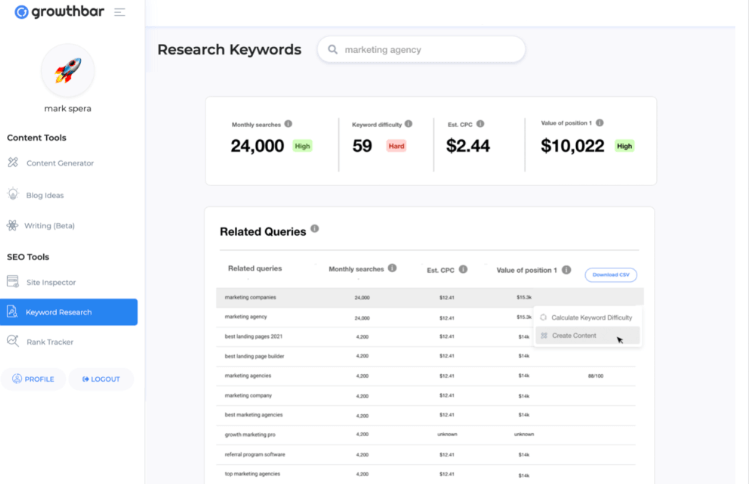
Coming up with a great plan to boost search engine visibility for your site isn’t something you do just once.
Ongoing maintenance and tracking are crucial to staying relevant, and local SEO tools like GrowthBar make it easy to keep on top of things.
GrowthBar is available as either a standalone tool or a handy Chrome extension and can be used to keep track of any website’s top keywords.
You can, of course, use GrowthBar to track keywords on your own site, but most marketers don’t stop there.
You can also use it to track the authority of your main competitors and any newcomers to the market.
In addition, the built-in rank tracker can help you monitor which domains are frequently showing up in specific searches and tell you which are ranking well for certain keywords.
Mark Sandusky of Peer Through Media used GrowthBar to take his agency to the next level and beyond. The tool helped his team drastically speed up workflow and expand into several new SEO categories.
2. SEMrush Listing Management Tool
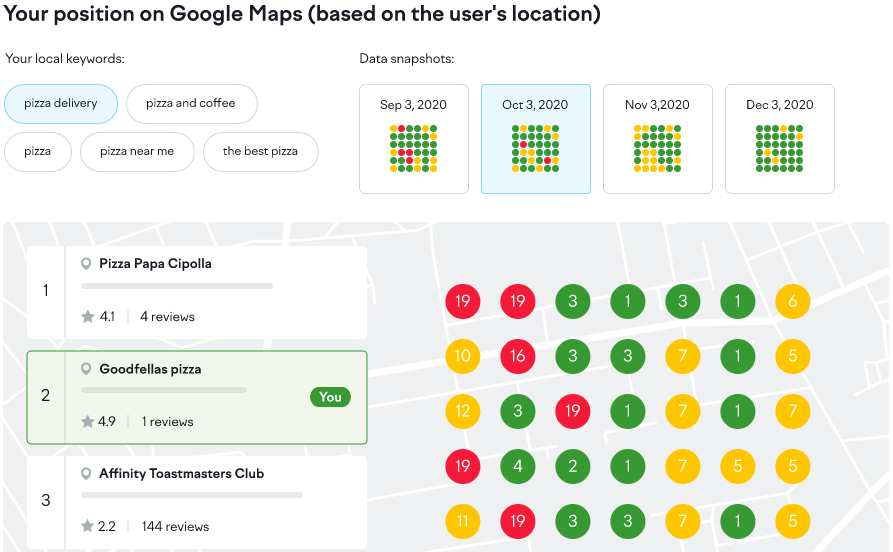
Getting your business’s website added to the best, most trusted online directories is an essential part of getting discovered and boosting your search engine rankings.
However, keeping all of your existing listings up to date on an ongoing basis can pose quite a challenge for busy marketers.
SEMrush Listing Management Tool is a simple, user-friendly way to check, track, and update crucial information about your business across multiple local, national, and global directories.
It’s also a great way to keep track of your business ranking in your location or any target city, as well as stay on top of customer reviews.
3. BiQ
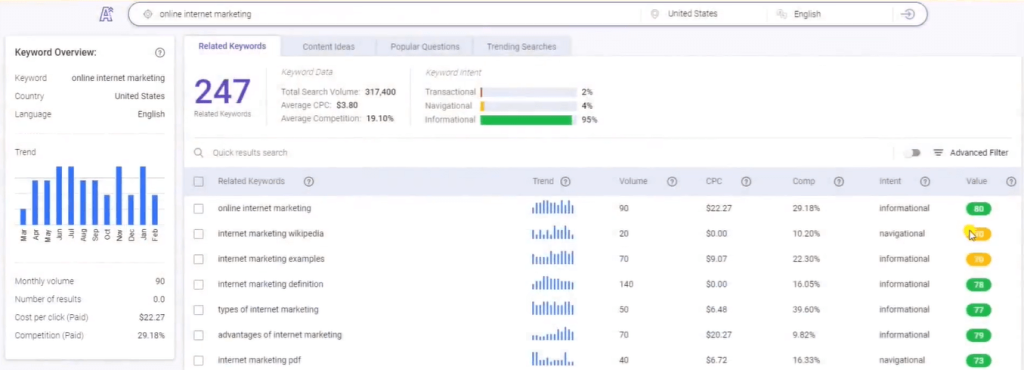
BiQ offers many of the same advantages other popular local SEO tools bring to the table but on a larger, more convenient scale.
For instance, BiQ helps you track rankings for up to 1000 keywords and key phrases in real-time.
Its interface also supports multiple languages and is available as a handy smartphone app, so it’s easy to manage your ongoing campaign however and wherever you’d like.
The usefulness of BiQ doesn’t stop there, though. You can also use it to analyze keywords, develop great ideas for your ongoing content marketing campaigns, and identify any potential gaps between you and your fiercest competition.
4. GeoRanker

Whether you’re looking to optimize for several different locations yourself or simply want to keep a close eye on how you stack up against your competitors, GeoRanker simplifies the process of rank-assessing any website on a local or global scale.
User-friendly heatmaps make it easy to see at a glance how well the specified website ranks in specific locations as compared to others.
GeoRanker also has detailed analytics and keyword ranking features, as well as a specialized tool that lets you track the sources of any citations your competitors may use.
Collectively, you can use this information to finetune your ongoing local SEO campaigns and stay ahead of the competition.
5. Local Falcon
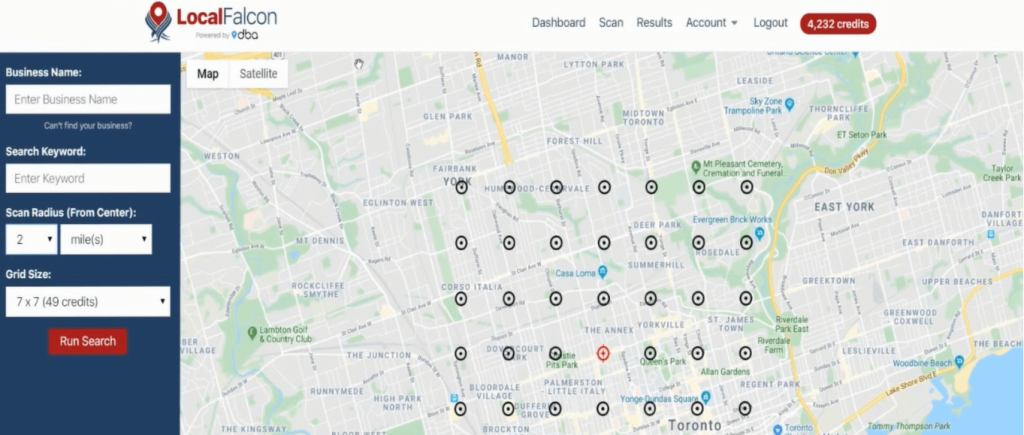
Although the most popular local SEO tools do great double duty as one-stop SEO resources, Local Falcon is a lot more specific as far as its benefits.
It needs to be set up one keyword at a time, so you’ll need to already know what key terms you’re targeting.
However, Local Falcon also offers meticulously detailed data you wouldn’t be able to get from most other options.
To begin with, Local Falcon lets you perform a thorough analysis of your local search efforts.
It can also help you make smarter, better-informed optimization decisions and help you predict their potential effect.
And pricing is incredibly flexible, so it’s easy for businesses of any size to factor this tool into their budget and keep growing this year.
6. KeywordTool.io

As a web tool, KeywordTool.io is so versatile, you may already be using it in other aspects of your SEO campaign.
But if you’re not applying it to your local SEO efforts yet, you totally should be.
It’s inexpensive, quick to set up, and very easy to use. It also makes an appropriate tool to start with, as you don’t need any existing local listings to get started.
KeywordTool.io leverages Google AutoComplete to help you develop numerous long-tail keywords on any topic you wish, so it’s a great way to expand or update your strategy.
In addition, it’s highly effective at generating focused search volume data, as well as filtering it by city. It even has keyword information specific to top platforms like YouTube, Amazon, eBay, and more.
KeywordTool.io is widely considered to be one of the best available alternatives to the ubiquitous Google Keyword Planner, and it’s got the social proof to back it up.
Some of the biggest, most recognizable household names in the world trust KeywordTool.io and include it in their ongoing SEO strategies. They include (but are not limited to) Microsoft, Adobe, Ikea, Grammarly, Shopify, Uber, and Healthline.
7. Yext

As you no doubt already know, staying aware of customer reviews so you can respond to them promptly is an integral part of reputation management for any business, local or otherwise.
But spotting every single one that goes up in a timely enough manner is nothing if not challenging.
So if you’re looking for local SEO tools that help streamline that process, Yext is something to take a closer look at.
Yext is a helpful tool on many fronts, but its review monitoring feature is especially helpful for those looking to boost local SEO.
It integrates with countless third-party sites to make you aware of new business reviews from numerous locations.
And you can even respond to them directly from your Yext dashboard, making it even easier to maintain good relations with your customers.
You may also be interested in these articles:
- Local SEO For Retailers: How To Reach A Ready-To-Buy Audience
- Boost Your Local SEO Ranking Factors for Business Success
- Improve Your Website’s Performance with These 7 Local SEO Solutions
8. Grid My Business
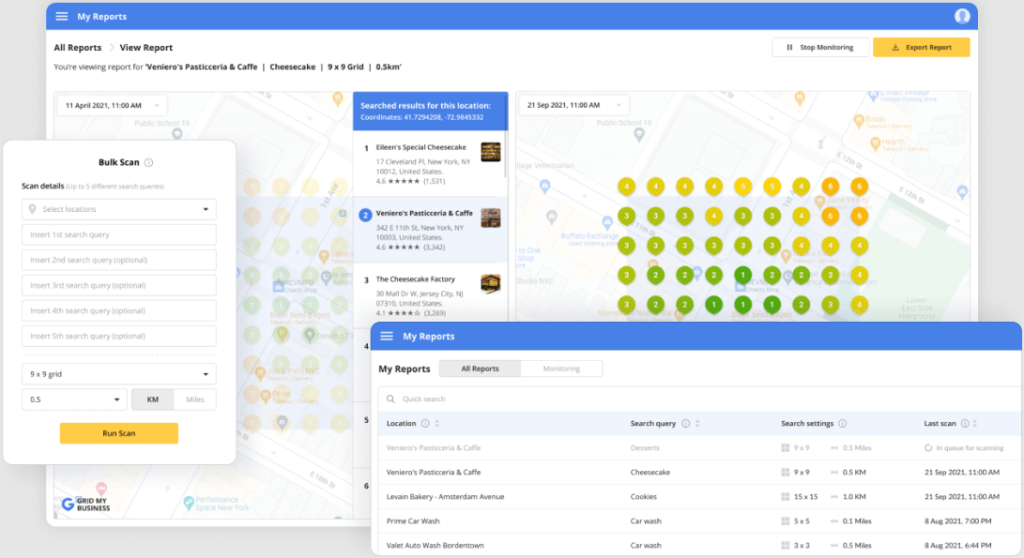
If you’re already using Google My Business to ensure essential information about your business is readily available to existing and potential customers, Grid My Business makes a great companion tool to have around.
It’s specially designed to work with Google My Business to compare your ranking with the current top 20 on a specific SERP. Just set the parameters of your grid and go.
You can easily keep track of your competitors’ rankings this way, as well as see at a glance how you stack up.
In addition, you can perform bulk queries to save you time and effort. You can also pre-schedule different types of scans to take the guesswork out of staying consistent on your own.
9. Synup

If you’re interested in local SEO tools that make reputation management easier, then Synup is another example you should take a closer look at.
It’s a fantastic way to track the performance of your company not only across search engines but review platforms and directories, as well.
Synup actively monitors more than 200 different directories, search engines, and more to locate any citation inconsistencies so you can fix them promptly.
In addition, it keeps track of your ongoing traffic and current web rankings for you.
Synup can even help you stay on top of new reviews and business comments so you can respond to them right away.
10. BrightLocal
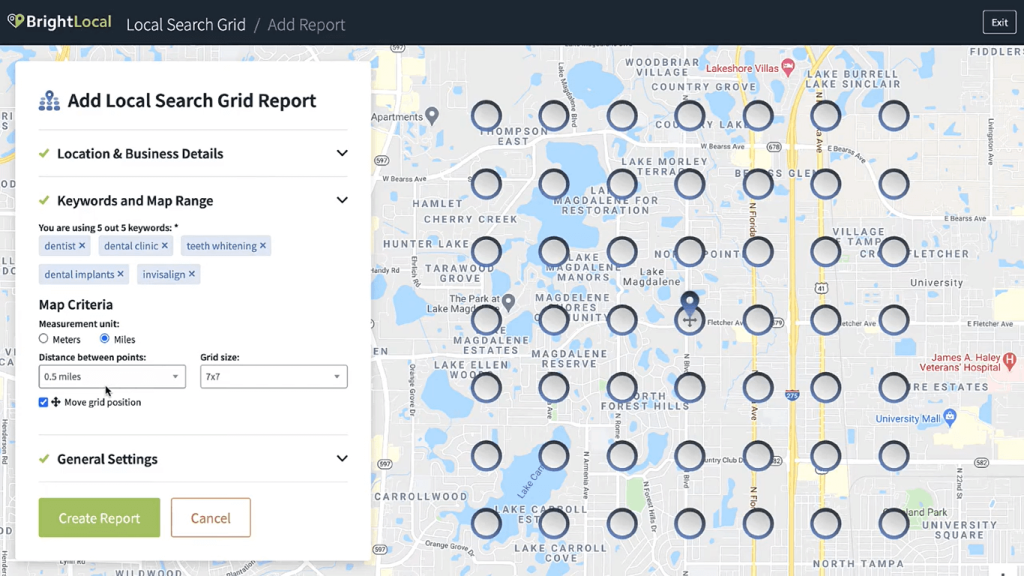
If you’re looking for a user-friendly, budget-friendly tool designed with the unique needs of small local business owners in mind, then BrightLocal definitely belongs on your radar.
It’s a terrific tool for regularly auditing local listings, on-site SEO, customer reviews, and other important local SEO signals.
If you’re like most small business owners, your time is at a genuine premium, so you’ll be happy to know BrightLocal lets you monitor or update citations across numerous directories via one easy process.
Search rankings across both Google and Bing are easy to keep track of, thanks to a unique grid-style view of your targeted area.
You can even use BrightLocal to create and manage new or existing review campaigns.
11. Moz Local

Moz Local is yet another terrific tool designed with the reputation management concerns of small, local, or growing businesses in mind.
Like other top local SEO tools, Moz Local lets you automatically distribute, monitor, and change your business data across many directories and platforms.
Plus, you can integrate Google and Facebook, making it easy to update those listings from your dashboard, as well.
You’ll also gain access to local reporting tools that take the frustration out of monitoring local search visibility, listing scores, and ongoing customer feedback.
Plus, a low learning curve and affordable pricing mean quick, easy progress when it comes to your local SEO efforts.
12. Google Business Profile
Your Google Business Profile (GBP) is a highly important part of local search.
It gives you a lot of room to fill in a keyword-optimized profile, choose correct categories, answer questions, add your services, and more.
A full, well-completed profile could get you an appearance in the local pack, which increases your visibility.
You can also make it look vibrant and attractive with quality video, images, posts, and graphics.
As usual, Google is looking for fresh, highly relevant, and top-quality content on your GBP. They want to see regular posts and updates, new reviews, and other user-generated content.
You can manage your reviews, reply to them, answer customer questions, and more. Customers can find all the information they need to buy from you, including an option to call you or book an appointment directly from your profile.
Don’t neglect this one. It’s extremely powerful and could hand you regular, quality leads if managed well.
13. LSIGraph
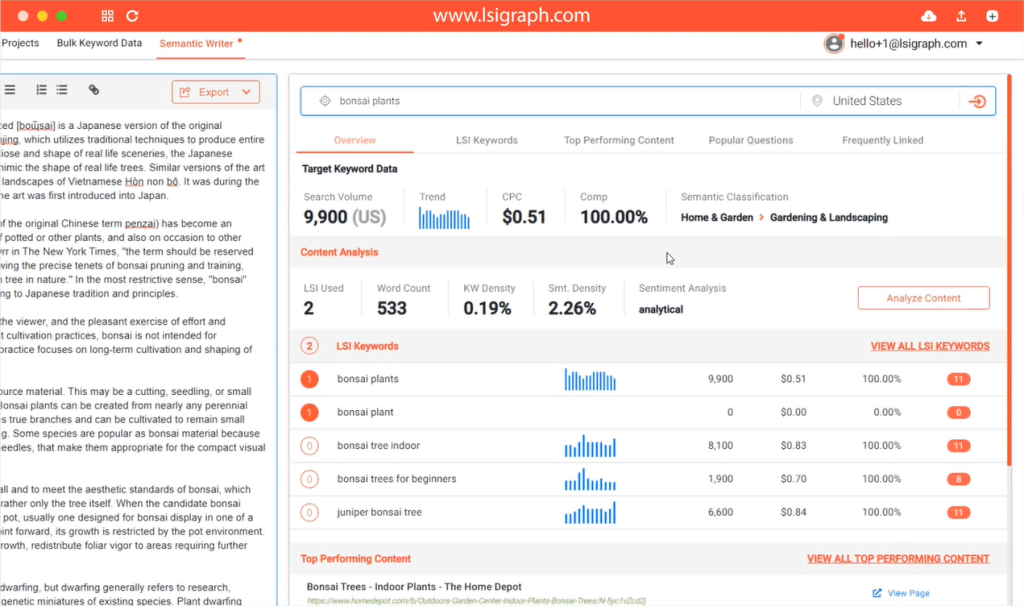
It’s not just about using the right keywords when chasing local search listings. It’s about query intent and creating content that matches that intent.
You’re wasting time creating an article, no matter how well written, if it doesn’t match the intent of searchers.
You’ve got to be consistent and ensure that everything creates a seamless experience and actually answers the search.
LSI or Latent Semantic Indexing helps with this. If you’re writing about Apple, you could be writing about computers or fruit. It’s the related keywords that help Google understand what your article is about and show it to the right readers.
For example, if you’re writing about the computer, you might also include keywords, such as “laptop”, “keyboard”, and “wi-fi”.
You also need to create what LSIGraph terms a “Contextually Relevant Content Silo”. This basically consists of several pieces of related and interlinked content in a topic cluster.
LSIGraph helps you target relevant keywords with the right intent, find the right audience, optimize your content, spy on competitors, and more.
14. SEOprofiler
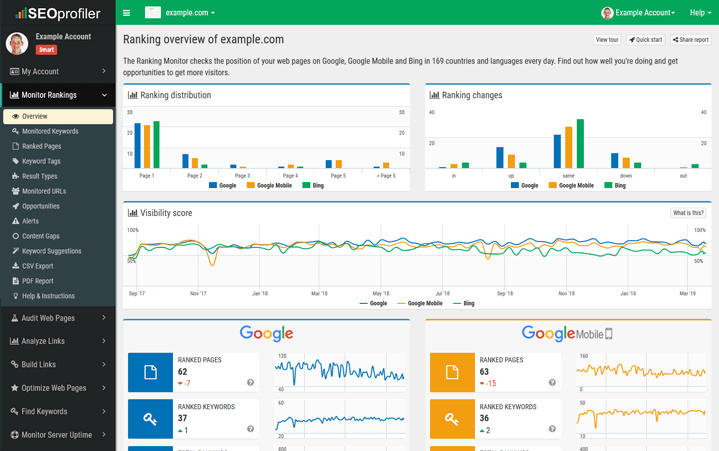
SEOprofiler has been sold and is under new management, so it’s best to keep an eye on this as what it offers may change.
Currently, you can monitor your own website and keep an eye on the competition too. You can also perform an SEO audit, which can be extremely helpful if you aren’t getting the results you want.
Other tools include a link analyzer, daily rank checker, off-page optimization, and more.
There’s also a dedicated tool for local SEO, which offers local optimization, rich results for local sites, and local ranking tracking.
15. Mangools
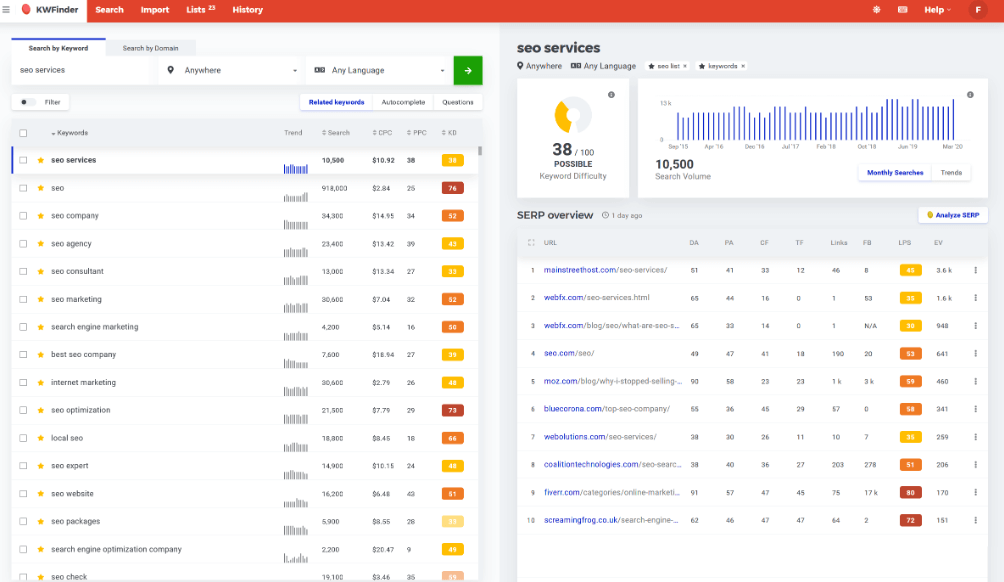
Mangools is a Chrome extension that provides what they describe as “simple but powerful SEO tools made for an effective SEO workflow.”
With this extension, you can find backlinks, track your rankings, discover good keywords for your business, and more. You can also get an analysis of your SEO efforts and your competitors.
This tool provides some great features that really could move the needle on your local SEO efforts.
There’s training available too, with an SEO guide, a glossary of SEO terms, and a guide to their tools.
16. Uberall
Uberall specializes in helping top-tier enterprise-level brands optimize their localized business listings on every level.
Its past and present client rosters include the likes of Google, Apple, and other household names, so it’s definitely capable of handling (and helping to create) mega-brands. Among other things, Uberall can:
- Take the guesswork out of keeping your Google My Business profile dynamic and up to date
- Ensure that all of your local listings are properly claimed as well as optimized for performance and search engine visibility
- Locate and remove bad or erroneous listings so that your business’s web presence is cohesive and accurate
- Optimizes your business data to monitor for errors and prevent them from occurring when possible
This option also offers tools that make it easier to boost visibility to nearby leads primed and ready to make a purchase, drive customer loyalty, and more.
17. Google Analytics
If you’re like most digital marketers, then Google Analytics is almost certainly already somewhere in your collective toolbox. But you should know that it’s also packed with insights to help you smash all of your local SEO goals.
Analytics offers detailed daily reports filled with information on the people who discover and visit your website, including locals.
Track and analyze bounce rate, session duration, pages per session, and more for insights on how well individual campaigns are going.
You can also use Google Analytics to find out which third-party websites are sending traffic your way, so it’s a terrific pick for tracking the success of guest posts, influencer partnerships, sponsorships, and various types of localized content or listings.
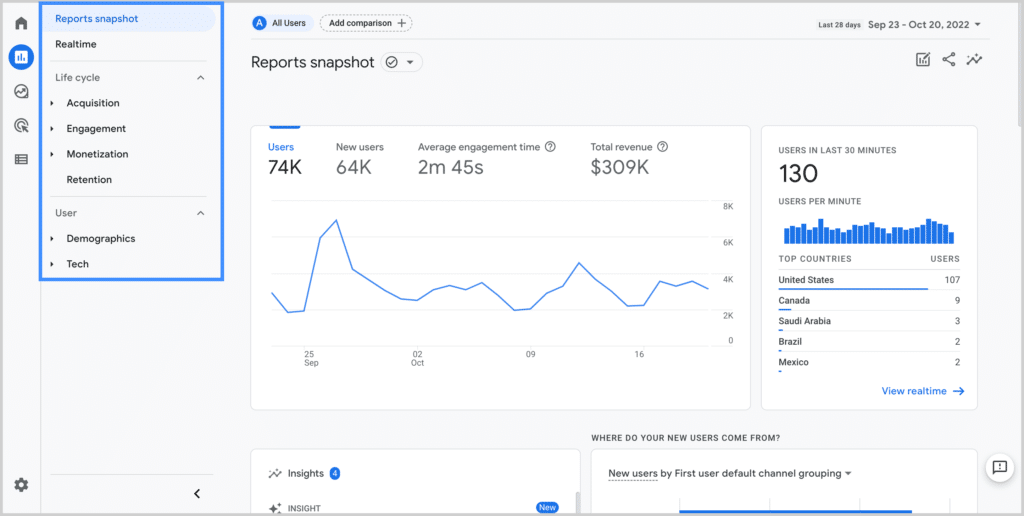
18. Whitespark
For small local businesses that could really use a reliable way to manage their reputations and keep track of reviews, citations, and more, Whitespark is an excellent choice.
Whitespark tracks multiple online elements, including maps, local packs, organic listings, and more across both Google and Bing.
This is also an excellent tool for tracking and managing your customer reviews across the web – an important concern for any local business.
Monitor over 100 different review sites, including all the big ones, so you can boost your reputation by addressing reviews and citations as soon as they appear.
Whitespark also leaves plenty of room for businesses to evolve with them.
New users can try the service and get started for free. However, there are various enterprise-level services available to support businesses as they open additional locations and continue to grow into the future.
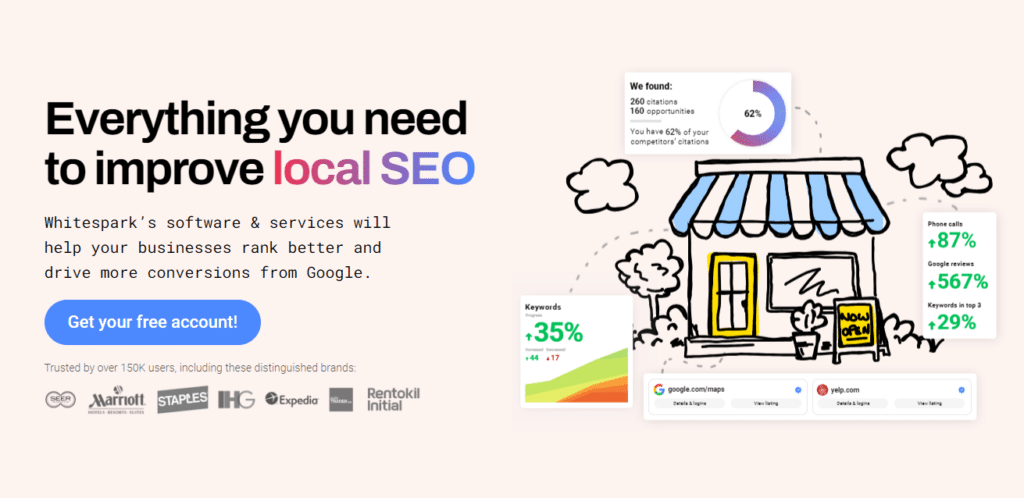
19. BuzzStream
Every local business needs a robust backlink catalog packed with high-quality entries, but link-building can be a time-consuming practice, as most marketers already understand. BuzzStream is a terrific tool that can help with that.
To be more specific, it takes a lot of the guesswork out of building a successful outreach strategy, so you can spend a lot less time on tasks like list-building, as well as stop wasting time altogether on emails that don’t drive results.
With BuzzStream, you can build high-quality e-mail lists in half the time and scale your email campaign without sacrificing quality.
It can help you with additional pursuits like content promotion, digital PR, email composition, and so much more, too.
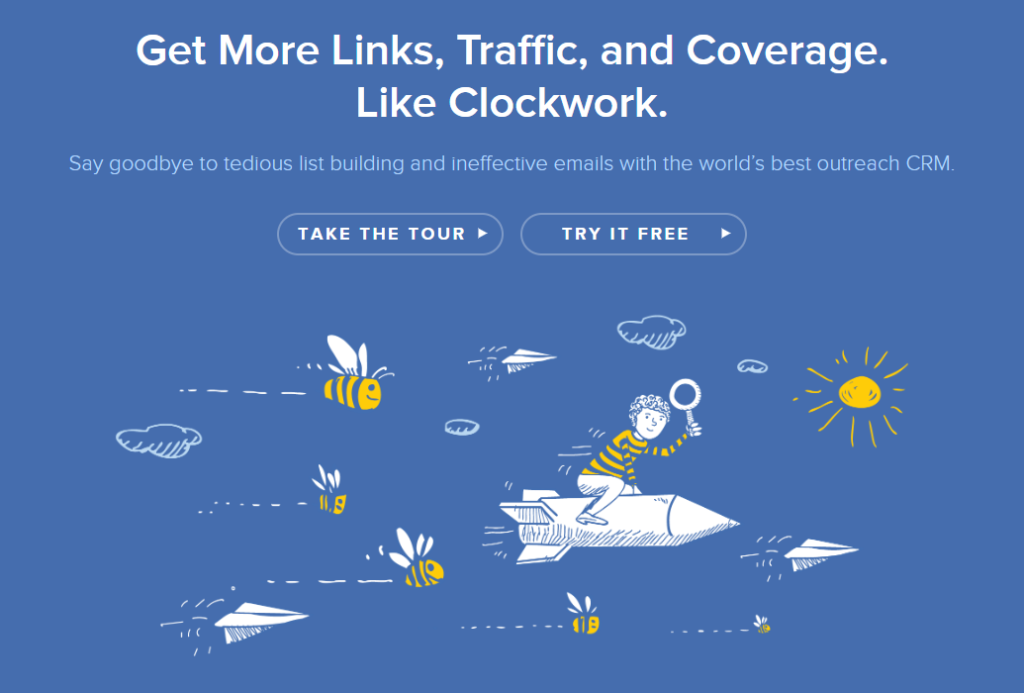
20. Vendasta
If you’re a local business owner or brand manager specializing in SaaS solutions for other local businesses, take a closer look at Vendasta. It’s perfect for managing multiple aspects of your SEO campaigns, marketing strategies, social media feeds, and more.
Automated marketing functionality lets marketers easily run effective email campaigns and deliver multiple types of content to audiences or contacts. There’s even an integrated chat feature that business owners can use to network and keep in touch with other local businesses, marketing partners, and more.
Pricing for Vendasta starts at $119 a month (and zero additional onboarding costs), with custom enterprise options available for the biggest companies out there.
So far, Vendasta serves over 60 thousand global agencies, as well as 5.5 million local businesses just like yours, to the tune of incredible results. Past and current clients include Hearst, Apartments.com, Salem Media, Group, Telkom, and many more.
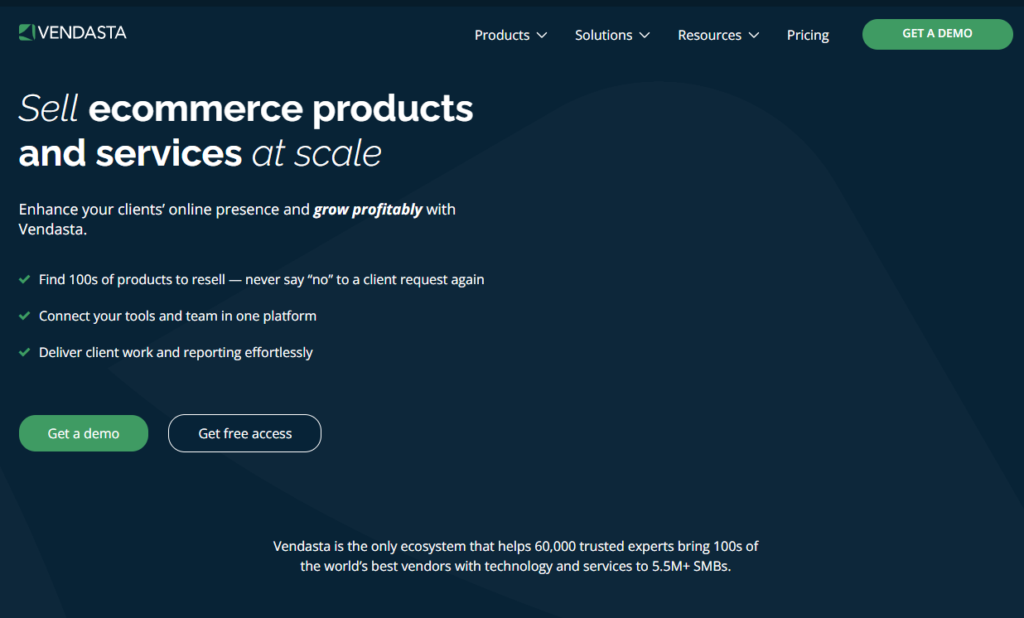
21. LocalClarity
LocalClarity is another terrific pick for multi-locale businesses in need of solid SEO and reputation management software. It streamlines the process of managing all of your locations, customers, and feedback in one convenient, organized platform.
Customizable dashboards let business owners sort and analyze reviews and reputation scores by region, state, city, store, and more, so it’s easy to get a good read on what’s going on with your brand.
You can also see at a glance how your customers interact with your online content.
And best of all, LocalClarity leaves plenty of room for businesses to grow and expand with the software. Plans start at just $10 per location, with custom-priced enterprise plans available for larger companies and corporations.
Wrap-Up
Now that you’ve got a full arsenal of incredible local SEO tools in your back pocket, it’s time to round out the rest of your campaign and set it up for success. That means creating plenty of original, high-quality content that will turn heads and convince people that your brand is worth a second look.
Scale your content production easily, affordably, and efficiently when you make WriterAccess a part of your ongoing SEO efforts.
Vet, hire, and work with thousands of talented freelance writers, designers, and editors when you sign up for a free two-week WriterAccess trial today!








